Diet Pills Addiction Treatment in New Hampshire
Diet pill addiction is a serious problem that requires quick action.
Millions of people have used diet pills at least once in their lives to help them with their weight-loss attempts. Yet, many of these individuals don’t realize that such medications can lead to addiction.
It’s a serious issue that we must shed light on, as the affected person will definitely need quick intervention. So, if you know someone who needs diet pills addiction treatment (detox) in New Hampshire, this article is for you.
Today, we’ll focus on diet pills and how they can cause addiction. We’ll also discuss the signs, symptoms, and available treatment options for those suffering from such addictions. Keep on reading.

What Are Diet Pills?
The term “diet pills” encompasses a number of drugs with the main aim of weight loss. You may hear people using other names for these pills, such as appetite suppressants, anti-obesity medication, anorexiant drugs, or centrally-acting anti-obesity preparations.
Such medications are mostly FDA-approved and available over-the-counter under numerous names. In fact, some of them work greatly toward achieving the goal they’re supposed to. However, people often overlook their long-term consequences.
In general, most of these pills are Schedule III or IV under the Controlled Substances Act. This means they have a moderate to low potential for developing psychological or physical dependence. Despite that, many people are abusing weight-loss pills at an alarming rate.
How Do Diet Pills Work?
Primarily, each group of diet pills works to fight obesity in a different way than the others. For example, some types of weight-loss drugs work by suppressing the appetite, while others increase metabolism. Moreover, a few names can prevent fat absorption altogether.
Principally, we can categorize diet pills into three groups (according to how they work).
- Stimulants: They work by increasing the activity of the central nervous system. This can lead to elevated energy levels and a more active metabolism. Furthermore, they affect specific neurotransmitters in the brain to reduce the feeling of hunger.
- Appetite Suppressants: These medications target the mechanisms that regulate hunger in the body. They may work by increasing serotonin or dopamine to reduce the feeling of hunger. They can also delay gastric emptying to prolong the feeling of fullness.
- Fat Inhibitors: Also known as fat blockers, fat inhibitors interfere with the body’s ability to absorb fats. They achieve that in a few different ways, including inhibiting the action of lipase, which breaks down fats during digestion.
What Are the Most Commonly Abused Diet Pills?
Despite being somewhat useful for those who try to control weight gain, many over-the-counter weight-loss pills have a high potential for misuse. Among the most commonly abused diet pills in the U.S. are:
- Benzphetamine (Didrex): It’s a type of stimulant diet pill that’s closely related to amphetamines. It works by releasing a neurotransmitter that regulates appetite and metabolism. Due to the potential for tolerance, it’s usually intended for short-term use.
- Diethylpropion (Tenuate, Tepanil): This is another appetite suppressant that shouldn’t be used for more than a few months. It works in the same way benzphetamine does and can also cause addiction if taken more often than needed.
- Mazindol (Mazanor, Sanorex): Used for short-term weight loss, it acts as an appetite suppressant as well. Its use is frequently associated with potential side effects and misuse risks.
Who Is at More Risk of Abusing Diet Pills?
People from various backgrounds can potentially abuse diet pills. Mostly, they get driven by factors like body image concerns, societal pressure, or the desire to lose weight quickly.
However, those who are more at risk of such an issue are teens and young adults, especially those who suffer from eating disorders.
According to the National Eating Disorder Association, about 50% of individuals with eating disorders have some kind of drug addiction.

Common Side Effects of Diet Pill Abuse
Because they fall under the category of stimulant drugs derived from Amphetamine, most diet pills carry a high risk of addiction. That’s because they, too, increase energy and happiness by stimulating some parts of the human brain.
Some of the most common side effects related to abusing diet pills are:
- Dizziness
- Insomnia
- Hallucinations
- Vomiting
- Rashes
- Dry mouth
- Swelling of legs and ankles
- Body itching
- Chest pain
- Dark urine or light-colored stool
- Yellowing of skin or eyes
The Side Effects of Long-Term Use of Diet Pills
Developing an addiction to diet pills after taking them for a while can have serious side effects. That’s especially true for the kind that has stimulant properties. Therefore, before attempting to take any diet pill, talking to a healthcare professional is a must.
That said, some of the side effects of prolonged diet pill use may include:
- Cardiovascular health problems
- Gastrointestinal issues
- Psychological effects
- Nutritional deficiencies
- Liver and kidney damage
- Chronic diarrhea or constipation
Signs of Diet Pill Addiction
Sadly, diet pill addiction is more common than you think. It happens mostly due to an underlying eating disorder. Yet, in some cases, it can be a result of other underlying mental health conditions.
In fact, you may not start noticing such an issue until the affected person starts showing signs. It’s essential to be able to recognize those signs for early intervention and treatment.
Here’s what to look for in an individual you suspect is abusing weight loss pills (most of them are similar to those associated with the use of many other addictive substances).
- Continued use of the weight loss pills even after causing physical and psychological side effects.
- Constant preoccupation with weight loss goals, dieting, and appearance.
- A need to increase doses of diet pills or prolong the use period to achieve the desired effects.
- Having to hide the pills or lying about using them to close people.
- Being unable to stop taking them, even when wanting to.
- Experiencing withdrawal symptoms when attempting to stop using or decreasing the dose of diet pills.
- Spending a lot of money on diet pills or supplements, eventually leading to financial difficulties.
- Having mood swings, irritability, or hostility when unable to access diet pills for any reason.
- Denying or minimizing the severity of the situation despite evidence of a negative impact on health and well-being.
Diet Pill Withdrawal Timeline and Symptoms
Withdrawal symptoms can start as soon as six hours after cutting off diet pills. For most people, the earliest signs of physical withdrawal can begin within the first 36 hours.
Such annoying symptoms keep intensifying daily, usually peaking within the first few days (five to seven) before tapering off. Despite the physical symptoms disappearing, cravings can last for months, if not years, after detox.
Withdrawal Symptoms
When trying to stop or decrease the excessive use of diet pills, a person may experience symptoms such as:
- Fatigue
- Depression and irritability
- Difficulty concentrating
- Muscle aches
- Cravings
- Increased appetite and weight gain
- Low energy levels
Diet Pill Addiction Treatment (Detox)
A person who wants to stop abusing diet pills can choose to go down a path of two: a cold-turkey detox or a medically supervised detox. Here’s a breakdown of each option and why the cold-turkey way isn’t recommended.
1. Cold-Turkey Detox
As the name suggests, cold turkey detox means stopping taking the drugs abruptly. In doing so, the body may go through a kind of shock. Consequently, withdrawal symptoms might become more severe and last longer than when stopping gradually.
What’s more, choosing the cold turkey method can pose significant health risks, such as increased heart rate, high blood pressure, dehydration, and cardiovascular complications. On top of that, the risk of relapse becomes even higher.
Despite that, many individuals decide to detox that way due to:
- Privacy concerns
- Financial inability to cover addiction treatment
- Fear of judgment
- Denial or minimization of the issue
- Previous successful attempts
- Desire to quit immediately
2. Medically Supervised Detox
A medically supervised program in a detox center is one of the best ways to treat addiction on the whole. It ensures the safety of patients and minimizes complications. Furthermore, it helps manage withdrawal symptoms and provides the necessary support throughout the process.
Here’s how the process goes for treating diet pill addiction:
- Gradual Tapering: Reducing the dose gradually is an effective way to minimize withdrawal symptoms and prevent severe reactions.
- Managing the Symptoms: Withdrawal symptoms vary from one person to the next. Fortunately, healthcare providers offer medications and care to manage these symptoms and ensure a comfortable detoxification.
- Providing Nutritional Support: Those recovering from diet pill addiction often have nutritional deficiencies due to poor dietary intake. Under medical supervision, they receive balanced meals, supplements, and proper hydration to support their health.
- Figuring Out Underlying Issues: Many common psychological issues accompany the misuse of diet pills, such as eating disorders, body image issues, and co-occurring mental health disorders.
- Addressing Underlying Issues: Counseling, therapy, and support groups help people explore the underlying issues behind their diet pill addiction problem. Then, they aid them in developing coping strategies and building resilience for long-term recovery.
- Providing Education: Healthcare professionals provide the necessary education about addiction, relapse prevention strategies, and resources for ongoing support. This helps many individuals maintain sobriety and make positive lifestyle changes.
Final Thoughts
Diet pill addiction is a serious problem that requires quick action. While millions may turn to these pills for weight loss, the potential for addiction and harmful side effects is mostly overlooked.
Luckily, countless treatment centers offer diet pills addiction treatment (detox) in New Hampshire. So, if you or a loved one may be suffering from diet pill addiction, don’t hesitate to ask for help from us at Live Freely Recovery Services.
Did this article answer your questions?
"*" indicates required fields
Take the First Step Towards a Brighter Tomorrow
At Live Free Recovery, we’re committed to walking alongside you on every step of your journey. Our compassionate team is here to provide the guidance and support you need to overcome addiction and reclaim your life. Don’t wait—reach out today to speak with someone who truly understands your struggles and can help you take that important first step toward healing and a fresh start.
Your path to recovery starts here.
